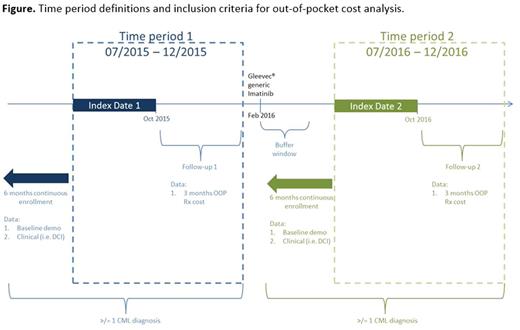Abstract
Introduction: Generic imatinib, a tyrosine kinase inhibitor (TKI), became available in the US for CML patients in 2016. Four newer BCR-ABL TKIs are also approved for CML (dasatinib, nilotinib, ponatinib, and bosutinib). Out-of-pocket (OOP) cost for drug therapy is the patient's portion of the drug cost under a health insurance plan. Historically, the OOP costs for the drug decreases when a branded drug becomes generically available.1 This may not be the case for CML, however, where most branded TKIs offer patient assistance programs for those in need that reduce the OOP burden. To examine this issue, we performed an analysis of patient OOP cost burden associated with branded and generic TKIs used for the treatment of US patients diagnosed with CML.
Methods: In this retrospective, cross-sectional study, the deidentified Truven Health MarketScan® Research US database and Optum Clinformatics™ Data Mart, a US administrative claims database were queried for TKI use in CML patients receiving 1 of 5 oral TKIs between July 1 and December 31, 2015 (time period [P] 1), and between July 1 and December 31, 2016 (P2). Truven database contains combined claims for >130 employers that sponsor private health insurance, representing ~40 million annually covered lives, comprised of a younger, commercially insured population. Optum ClinformaticsTM Data Mart includes both commercial and Medicare covered lives.
Index date was defined as the first TKI therapy claim within P1 and P2. Patients must have been continuously enrolled for ≥6 months prior to the index date with a CML diagnosis (ICD-9 205.1x) any time during the observation window (Figure). OOP = copay + coinsurance. Descriptive statistics present baseline demographic and clinical characteristics of the overall TKI population with CML between P1 and P2. Further subgroups were explored across imatinib and branded TKIs at P1 and P2. Descriptive statistics included means ± standard deviation (SD), medians, and relative frequencies where applicable.
Results: In the Optum database, 974 and 1,248 CML patients (mean age, 59.8 and 60.0; 43.9% and 46.8% female; Charlson Comorbidity Index [CCI] score, 2.9 and 2.9) received a TKI in P1 and P2 cohorts, respectively. Of 889 P1 and 1,137 P2 prescriptions filled, imatinib captured 458 (51.5%) and 552 (48.5%), respectively. For all TKIs, the median OOP cost was $20.0 during P1 (mean, $133.7; SD, $328.2) compared with $0.0 per prescription during P2 (mean, $117.2; SD, $280.6). Similarly, the median OOP costs to patients for branded imatinib were $25.0 during P1 (mean, $145.2; SD, $279.8). Once imatinib became generic, the OOP cost decreased to $5.0 (mean, $113.8; SD, $215.7).
In the Truven database, there were 1644 and 1683 CML patients (mean age, 55.0 and 55.0; 44.0% and 43.9% female; CCI score 2.64 and 2.70) during P1 and P2, respectively. Of 1,348 P1 and 1,425 P2 prescriptions filled, 674 (50.0%) and 680 (47.7%), respectively, were for imatinib. Median OOP cost for all TKIs were $35.0 during P1 (mean, $85.2; SD, $545.7), and specifically $30.0 for branded imatinib (mean, $98.5; SD, $739.4). Once imatinib became generic, the median OOP cost for overall TKIs was $16.7 (mean, $77.7; SD, $421.0) and $9.0 for imatinib (mean, $71.4; SD, $499.6) during period 2.
Conclusions: In both databases, the OOP burden to patients had minimal impact once imatinib became generically available. The OOP costs before and after generic entrance of imatinib was under $35 in the US. Potentially, the availability of patient assistance programs may contribute to the lack of OOP cost differences before and after generic imatinib. Thus, prescribers should be aware of the minimal OOP cost differences that patients face when deciding on which TKIs to prescribe.
References:
1. Lemye R 2000. Generic Drugs. Rev Med Brux. Sep;21(4):A273-5
Kim: Pfizer: Employment, Equity Ownership. Malhotra: Pfizer: Employment. Bell: Pfizer: Employment. An: Pfizer: Employment, Equity Ownership. Mardekian: Pfizer: Employment.
Author notes
Asterisk with author names denotes non-ASH members.


This feature is available to Subscribers Only
Sign In or Create an Account Close Modal